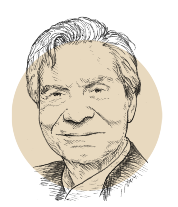Invited to pursue my studies in economics at Stanford University in California in 1985, I discovered machines that were unknown in France; computers equipped with word-processing software and new means of global communication, the Internet. The digital adventure was just beginning – the World Wide Web was yet to be created by a British scientist in 1990, and its use would only become widespread in 1994. Facebook, which was to change the world in the era of social media, did not appear until 2004 – a new age, yet so recent. Like every technological revolution since the invention of the loom, the Internet destroyed whole sectors of the economy. Millions of jobs disappeared and more were created. The mathematical balance is at an equilibrium, in principle, or even positive. But what we call progress is not only technological; it is also social, cultural, and moral.
Just as new jobs push out old ones, new values take the place of traditions. Is progress in machines necessarily progress in civilization? Skepticism has always accompanied the cascade of new technology since the dawn of the Industrial Revolution. In the decade after 1810, English weavers inspired by the legendary character Ned Ludd destroyed new spinning machines. The canuts, the silk workers of Lyon, did the same thing in 1831. Will the Internet and social media soon meet the same fate, suffering a comparable attack by neo-Luddites and machine-destroyers? Or even by defenders of national languages and cultures, which are being Americanized by social media through the imperialism of the English language and the omnipresence of U.S. trends such as the selfie? You might object that the success of the Internet, Google, Facebook, and Twitter marginalizes any resistance. There are a few isolated intellectuals who boast that they do not own a computer; philosopher Alain Finkielkraut even wrote a book on the topic: Internet, l’inquiétante extase (“The Internet, a Troubling Ecstasy”). But such reactions remain on the fringes. My view is that to shut oneself off from the world makes it impossible to understand the world; critical thinking requires that, before criticizing, we see what others are seeing.
Another more serious line of attack comes from governments. Dictators, who know only how to forbid, censor the web; the Chinese Communist Party is the world champion in this arena. Taking a more legitimate stance, European governments are attempting to control the economic and fiscal abuses of monopolies such as Facebook, and also compelling them to moderate their users’ incitements to hatred. Here we are touching on what is really at stake: How can we save the Internet from itself, and protect ourselves from its most destructive aspects? Social media destroys culture in the traditional sense; rather than read, we surf online. Rather than learn, we fall back on Wikipedia. We no longer read newspapers, instead replacing them with rumors spread on social media. We no longer inform ourselves; we prefer conspiracy theories that encourage Internet addicts to believe that they know the secrets of the world hidden from them by journalists. As a result of this dynamiting of verified knowledge and information, for the most fragile masses, falsehood has become the equivalent of truth, and the virtual is as good as the real. Since everyone has a platform, and everyone dreams of becoming an influencer, narcissism has replaced life in society.
This is why the decline of Facebook strikes me as good news: four million fewer users between September and December 2021! One might object that Facebook still has between two and three billion subscribers, for the most part unverifiable – as are those on Twitter, which seems to have rigged its audience numbers to get the highest price from Elon Musk. One might also object that those deserting Facebook are going over to TikTok, which is not an encouraging sign. But maybe there are some, the most enlightened, who are leaving Facebook in order to reconnect with reality, with truth, with society. It so happens that book sales are on the rise. The lockdowns brought about by Covid may have contributed to a rediscovery of reading, but it is incontestable that the taste for reading is making a comeback, beyond any effects of the pandemic. Similarly, readers are returning to good newspapers – Le Monde and The New York Times, to name but two. It is possible that a certain number, a critical mass, are returning to the path of reason, without becoming Luddites.
I will conclude my diatribe with a story about a mouse. English biologists have announced, in the journal Nature, the discovery of a gland in the brains of mice that appears to arbitrate between positive and negative sensations. The human brain being close to the mouse’s, this gland would enable us to choose between good and bad, in all domains. Medication acting on this gland might be able to treat depression. Let us hope that, as a consequence of this scientific breakthrough, someone will find another gland that makes it possible to distinguish between truth and falsehood; such a discovery would mark the end of the reign of social media and other manipulations of reality.
Editorial published in the October 2022 issue of France-Amérique. Subscribe to the magazine.












